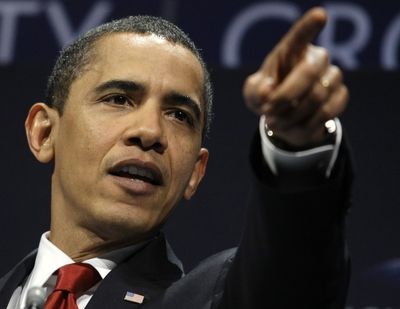G-20 pledge $1.1 trillion to weakest economies
Regulatory framework also agreed upon

LONDON – Choosing compromise over political division, leaders of the world’s most important economies pledged Thursday to offer $1.1 trillion in loans and guarantees to countries most badly damaged by the global downturn, encouraging hopes that their concerted action could nudge the world economy toward recovery.
The measures announced at the Group of 20 summit might not constitute the “new global deal” called for by the host, British Prime Minister Gordon Brown, and U.S. President Barack Obama. But the result still surprised many observers by achieving substantive results: a commitment to prop up tottering economies of developing nations through the International Monetary Fund and vows for a heavier regulation of international finance.
The one-day conference ended with smiles and back-thumps among the leaders, projecting an image of unity where a breakdown of purpose had been feared.
“The whole world has been touched by this devastating downturn, and today the world’s leaders have responded with an unprecedented set of comprehensive and coordinated actions,” said Obama, who described the raft of measures unveiled Thursday as “a turning point in our pursuit of global economic recovery.”
The collective plan capped weeks of haggling – some of it behind the scenes, some of it awkwardly public – that at times put the summit’s outcome in doubt. But threats of a French walkout over a U.S. push for more government stimulus spending did not materialize.
French and German calls for greater regulation of financial markets were answered with pledges to crack down on tax havens and to implement controls on executive pay, although the call by French President Nicolas Sarkozy for a global financial regulator was reduced to a pledge for a “more globally consistent, supervisory and regulatory framework.”
The promise of $1.1 trillion to help poor countries exceeded even the most optimistic expectations. The money will help small nations from tumbling into deep economic crisis, essentially serving as a firewall to keep the recession from deepening, analysts said.
The International Monetary Fund is expected to use the infusion of credit to issue loans and grants to developing nations and, in so doing, spur global trade. That, in turn, would benefit industrialized nations such as the U.S. and Germany, the world’s largest exporter, who need a boost in demand for their exports.
“This is one genuine element of surprise: the fact the G-20 could come together and agree to such a substantial increase in the IMF resources,” said Eswar Prasad, a senior fellow at the Brookings Institution and a former IMF official. “It will prevent any further crises in the emerging markets or small developing countries.”
Last month, Treasury Secretary Timothy F. Geithner had proposed doubling the IMF fund to $500 billion. The new plan increases the amount to $750 billion, with $100 billion of that coming from the U.S. and an equal amount from both Japan and the European Union.
Additional money will be made available as loans to exporters, which have been hit hard by the global freeze in bank lending.
The American argument, that boosting fiscal spending worldwide, up to about 2 percent of global GDP, was necessary to kick-start the economy, was adamantly resisted by countries such as France and Germany, which are leery of building public debt and want more time for their initial stimulus packages to take effect. Instead, contributing to the perception of a deep trans-Atlantic divide, they insisted that what was needed was reform of the finance sector, including closer inspection of hedge funds and eliminating tax havens.
The G-20 moved in that direction Thursday with a pledge to “extend regulation and oversight to all systemically important financial institutions, instruments and markets,” to establish tough guidelines on executive salaries and to use sanctions if necessary against countries serving as tax havens, which allow international financial institutions to operate outside the reach of regulators.
“The era of banking secrecy is over,” the summit communique declared.
Most of the new regulatory changes called for by the G-20 will have to be enacted by each individual country. Obama sought to play down the disagreements, after days of efforts by him and his aides already to dampen expectations of new domestic stimulus packages after it became clear that he would not achieve them.
“Some commentators confused honest and open debate with irreconcilable differences,” he told reporters after the meeting.